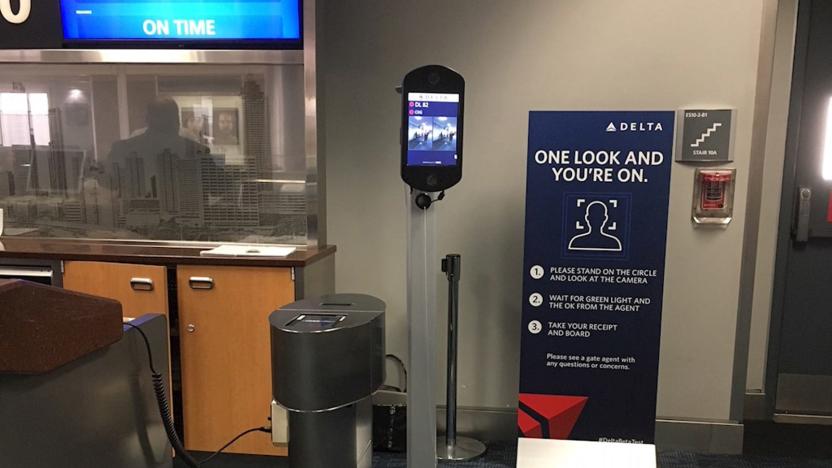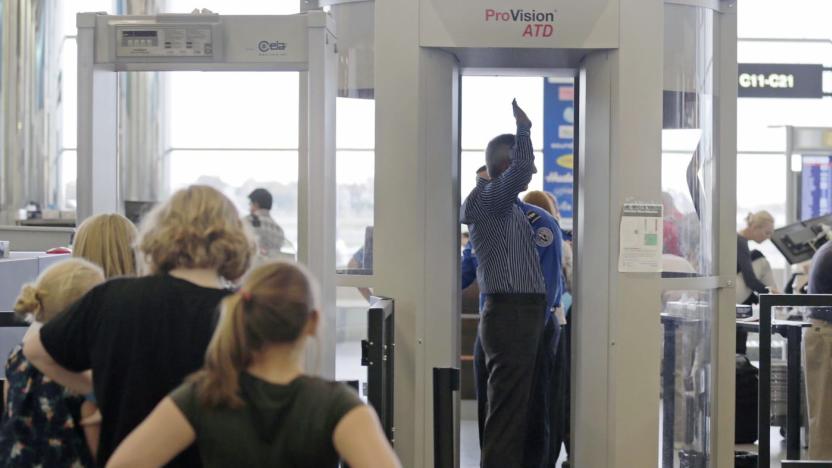TransportationSecurityAdministration
Latest

TSA outlines its plans for facial recognition on domestic flights
The Transportation Security Administration is determined to make facial recognition and other biometrics a regular part of the airport experience, and it now has a roadmap for that expansion. The effort will start by teaming with Customs and Border Protection on biometric security for international travel, followed by putting the technology into use for TSA Precheck travelers to speed up their boarding process. After that, it would both devise an "opt-in" biometric system for ordinary domestic passengers and flesh out a deeper infrastructure.

Full-body TSA scans are mandatory for 'some passengers'
The Transportation Security Administration was under pressure to establish rules regarding airport body scanners, and well, the Department of Homeland Security's weighed in. Now the Advanced Imaging Technologies (AIT) using Automatic Target Recognition (ATR) will be mandatory in certain cases. Slashgear notes that prior to this the scanners were opt-in, and one could go through a contactless, non-imaging scan instead. That option will exist, but security agents can insist on mandatory screening "for some passengers." The argument the DHS gives (PDF) is that these scanners are more capable of detecting prohibited, non-metallic items that could be hidden under a few layers of clothing than a metal detector wand would be.

Court orders TSA to set rules for full-body airport scanners
Did you think the Transport Security Administration was reckless when it started installing full-body scanners at airports several years ago? So did the Competitive Enterprise Institute -- and the libertarian think tank just won a legal victory that could make the TSA clean up its act. In the wake of a lawsuit, the US Court of Appeals has ordered the TSA to finalize a rulemaking schedule for the scanners by November 22nd. The agency was supposed to have established rules for the scanners before it even installed them, but it has dragged its heels ever since -- even a 2011 order to "promptly" establish rules didn't do much. With this ruling, the TSA doesn't have much of a choice.

Following the TSA's lead, the NTSB drops Blackberry for iPhone
According to a report in the Wall Street Journal, the National Transportation Safety Board, or NTSB, may join the growing number of government agencies that plan to ditch the BlackBerry in favor of the iPhone. A notice posted on the Federal Business Opportunities website announces that the NTSB is working with Verizon Wireless to supply iPhone 5 handsets to the agency. In a PDF justification for the "sole source" declaration regarding Verizon and the iPhone 5, the NTSB says that the agency "requires effective, reliable and stable communication capabilities to carry out its primary investigative mission and to ensure employee safety in remote locations." The agency pointed out that BlackBerry handsets "have been failing both at inopportune times and at an unacceptable rate." The NTSB noted that iPhones are the best solution going forward as they are compatible with the agency's fleet of iPads and can be supported by the existing IT and messaging infrastructure in place there. The NTSB is getting a substantial discount on the iPhone 5 handsets in consideration of the expenditures already incurred to buy BlackBerry units from the carrier. This isn't the first government group to drop the BlackBerry. Earlier this year, the Defense Department announced it was accepting proposals for an iOS or Android-based software security system for mobile devices. This contract could eventually support up to 8 million devices, says a report in USA Today. The Immigration and Customs Enforcement confirmed in September that it would switch its 17,676 mobile users to the iPhone because the BlackBerry could "no longer meet the mobile technology needs of the agency"; the Bureau of Alcohol, Tobacco and Firearms made a similar move earlier in 2012. The Transportation Security Administration also announced in May that it would drop both BlackBerry and Windows mobile devices and replace them with Apple products in a deal worth $3 million. Despite these setbacks, beleaguered RIM says it still has "1 million government customers in North America alone who depend on BlackBerry, and more than 400,000 government customers worldwide upgraded their devices in the past year." [Via WSJ and USA Today]

US TSA eyeing Macs, iOS devices to assist mission
America's favorite frisking and body scanning team -- the Transportation Security Administration (TSA) -- is about to go Apple. NextGov is reporting that the TSA has put out a request to possibly purchase any number of Apple products to "support specific areas of TSA's Risk Based Counter-Terrorism mission." TSA's Office of Acquisitions is planning to enter into several contracts over the next three years to buy Apple products and services with a maximum value of US$3 million. They're not just looking at Macs and iPads; according to a TSA document (PDF), "The proposed procurements may include any products currently within or added to the Apple line of products to include but not limited to: Apple computers/laptops, Apple iPads, Apple iPhones, Apple iPods, Apple TV, Apple OS (sic), Apple App Store applications, Apple peripherals and accessories such as monitors, mice and keyboards, and such services as installation, software updates, extended warranty and repairs, including AppleCare, required to support the Apple product line in an enterprise/production environment." The document goes on to describe why TSA is looking to sole-source the Apple line, stating that it "requires the hardware, software and licenses to support a greater diversity of devices and operating systems as we follow the public driven demand for more mobility." TSA states that they'll be issuing a separate document for "Google Android" hardware, software and services to cover another "TSA capability gap."

TSA: Netbooks, e-readers and iPads can be kept inside bags during airport checks
The American Transportation Security Administration has used its blog, of all things, to inform the good people traveling to, from, and within the USA that portable computers smaller than "the standard sized laptop" need not be removed from their bags. What is the standard sized laptop, you ask? Well, we're not exactly told, but Kindles, iPads, Sony Readers, Nooks, and "Net Books" are explicitly named as being exempt from the annoying requirement to unbag your computer for the airport's prissy X-ray scanners. There's still the disclaimer that staff might want to take a second look at anomalous-looking gear, but for the most part you'll be just fine leaving that Eee PC in your backpack while making the barefoot jaunt through security.

Phoenix airport set to test all-seeing x-ray
Phoenix Sky Harbor International Airport looks to have the distinct honor of being the first airport in the United States to put the controversial "backscatter" x-ray technology to use, the very same excessively-intimate inspection technique that made its debut at London's Heathrow airport a couple of years back. The airport won't just be taking a peek at everyone that passes through the gate, however, instead using the scanner as a backup to existing screening measures -- and, even then, individuals will have the option of a pat-down search instead of the picture postcard seen here. What's more, unlike earlier implementations of the technology, the Transportation Security Administration has reportedly sanitized the end results somewhat, with certain areas being discreetly blurred out, and no images saved after the person steps away from the machine. While the Phoenix airport gets to be first it, not suprisingly, won't be the last, with the TSA saying that a "handful" of other airports will be installing some scanners of their own sometime early next year.[Thanks, Ben B.]




